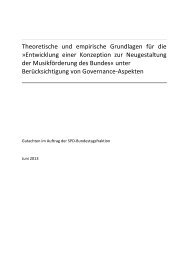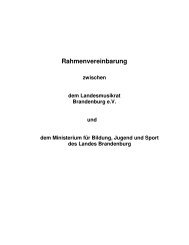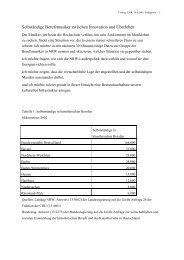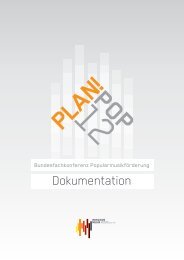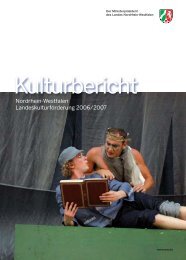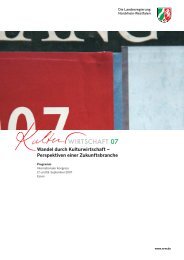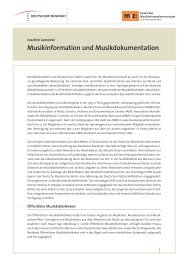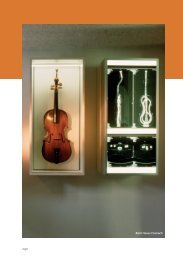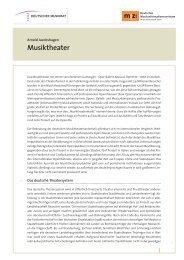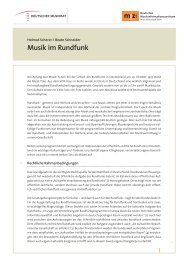Create successful ePaper yourself
Turn your PDF publications into a flip-book with our unique Google optimized e-Paper software.
Case Studies<br />
From The<br />
Coal Face<br />
The Indie Label<br />
Keith Armstrong is the co-founder<br />
of Kitchenware Records, based in<br />
the northern UK city of Newcastle.<br />
Kitchenware is a development label,<br />
often signing artists at the very<br />
beginning of their career.<br />
“When we were starting out back<br />
in the early 80s,” recalls Armstrong<br />
“there was a campaign running<br />
called ‘Home taping is killing music’.<br />
Our slogan was ‘Home taping broadens<br />
minds’. But illegal file-sharing is in<br />
a completely different league and is<br />
devaluing and cheapening the way<br />
people perceive music.”<br />
Armstrong says that for many of<br />
his acts, the revenue coming in from<br />
their first sales is essential to help<br />
them sustain their career. “That revenue<br />
is recycled straight away into building<br />
their profile and taking them to the<br />
next level, but it is disappearing.”<br />
He cites Editors as an example of an<br />
act that has proved highly successful<br />
in the UK and Europe and seems<br />
popular in the US but is unable to<br />
establish sales there. “The guys regularly<br />
sell out plenty of four thousand seat<br />
venues on both coasts, but their albums<br />
only sell 50,000 copies. They seem at<br />
the mercy of the piracy culture.”<br />
Sirens, an all-girl dance act, have a very<br />
different profile, but suffer from the<br />
same problem. “We’ve promoted them<br />
in the dance clubs and their first singles<br />
Piracy is hitting Kitchenware’s acts Sirens and Editors<br />
Teemu Brunila<br />
“ We live in a world where<br />
€1 is considered extravagant<br />
for a music download.”<br />
Teemu Brunila, singer-songwriter<br />
have done really well in the dance<br />
charts, but I’ve seen online that there<br />
have been 15,000 illegal downloads of<br />
their next single that hasn’t even begun<br />
to play on the radio yet and won’t be<br />
released until next year. Not every one<br />
of those downloads was probably a lost<br />
sale, but even one in three of them<br />
would have bought the girls some vitally<br />
needed tour support.”<br />
Armstrong says: “I used to work in HMV,<br />
and if someone came in and started to<br />
steal records we’d chase them down the<br />
street. Uploaders are doing essentially<br />
the same thing as those shoplifters. My<br />
artists are being hit. Editors and Sirens<br />
both backed Lily Allen when she took a<br />
stand for new artists last year and said<br />
this had to stop.”<br />
The Artist-Songwriter<br />
Teemu Brunila is a Grammy Awardwinning<br />
singer-songwriter from Finland<br />
and former lead vocalist of The Crash,<br />
‘Climate Change’ For All Creative Industries<br />
one of the country’s leading pop-rock<br />
bands. The Crash released four albums<br />
in 10 years and sold records in 30<br />
countries between 1999 and 2009.<br />
“The Crash was an appropriate name,”<br />
says Brunila ruefully “as we lived<br />
through the great crash of the music<br />
business.” Some critics may suggest<br />
that the band should not have suffered<br />
as increasing live revenues would have<br />
offset falling record sales, but Brunila<br />
dismisses that view. “90 per cent of our<br />
yearly income as a band came from<br />
copyright channels, not live, despite the<br />
band touring 20 countries. Make no<br />
mistake, in a world with no copyright<br />
protection, freedom of information will<br />
become freedom from information<br />
because no one will do a damn thing<br />
creatively. Song writing would cease to<br />
be a profession.”<br />
He cites an example. “One year the<br />
band played Valmiera, the biggest<br />
music festival in Latvia. We drove in<br />
from the airport and heard our songs<br />
on the radio. We headlined the festival<br />
and the 10,000-strong crowd roared<br />
out our songs. When we came off stage<br />
I asked our label representative how<br />
many records we had sold in Latvia. The<br />
answer was like a slap in the face. 200.”<br />
As he now concentrates on song<br />
writing, Brunila is aware that many<br />
in his profession have been badly<br />
squeezed by falling music sales.<br />
“The average songwriter in Finland earns<br />
€1,600 a year before tax, discounting<br />
performance fees. Just 200 songwriters<br />
earn more than €20,000 a year. That has<br />
come about because we live in a world<br />
where €1 is considered extravagant<br />
for a music download, but a couple of<br />
euro is considered reasonable for<br />
a Starbucks coffee.” n




